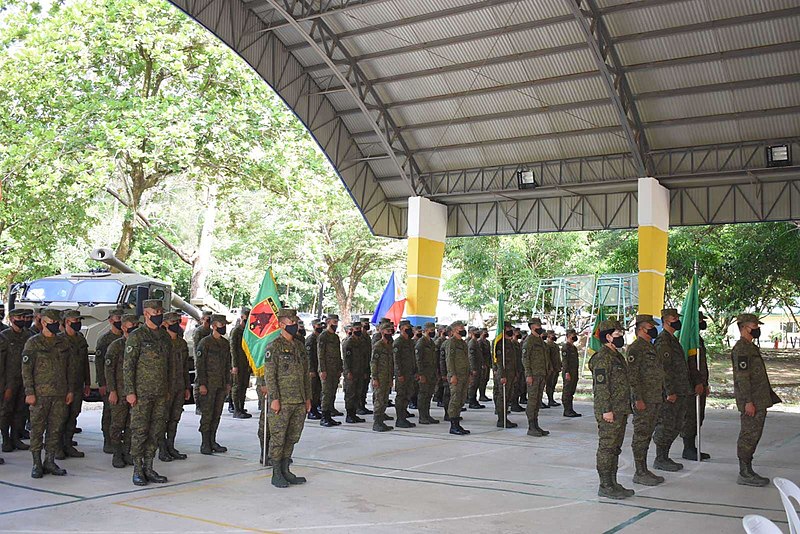The Philippines this week announced the four additional military bases that the United States would be given access to. The additional military bases are in line with a defense agreement between Manila and Washington that advances the alliance between the two countries.
On Monday, the Philippines identified the four additional military bases in line with the expanded Enhanced Defense Cooperation Agreement, which grants US access to military bases for joint training, pre-positioning of equipment, and the building of facilities. The sites announced on Monday are the Carillo Osias navy base in Sta. Ana and Lal-lo Airport in Cagayan province, Camp Melchor Dela Crus in Gamu, Isabela, and the island of Balabac off of Palawan.
The locations of the sites are significant as Cagayan faces north towards the island nation of Taiwan, and Palawan is close to the disputed Spratly Islands in the widely contested South China Sea, which China claims control over the majority of the waterway and built artificial islands with runways and missile systems. Neighboring countries, including the Philippines, have overlapping claims to the body of water.
Philippine defense chief Carlito Galvez said the sites are “very strategic” and stressed the responsibility the Philippines has to the international community in the South China Sea.
“That’s a trade route…where more or less $3 trillion trade passes,” said Galvez. “Our responsibility to collectively secure that is huge.”
The office of Philippine President Ferdinand Marcos Jr. said the four sites should “boost the disaster response” and help in humanitarian and relief operations, with the defense of the east coast also taken into consideration. Marcos Jr. announced the decision to expand US access under the agreement back in February.
Washington has committed over $80 million worth of infrastructure in the existing five bases it has access to – the Antonio Bautista Air Base in Palawan, Basa Air Base in Pampanga, Fort Magsaysay in Nueva Ecija, Benito Ebuen Air Base in Cebu, and Lumbia Air Base in Mindanao.
On Tuesday, Malaysian Prime Minister Anwar Ibrahim said China has expressed concerns about the energy activities of Malaysian energy firm Petronas in the disputed waters and stressed that the projects are within its territory. This follows Anwar’s comments that leave the door open for negotiations with Beijing this week amidst pressure on the country’s energy operations in the South China Sea.



 US Pushes Ukraine-Russia Peace Talks Before Summer Amid Escalating Attacks
US Pushes Ukraine-Russia Peace Talks Before Summer Amid Escalating Attacks  Trump Signs Executive Order Threatening 25% Tariffs on Countries Trading With Iran
Trump Signs Executive Order Threatening 25% Tariffs on Countries Trading With Iran  Japan Election 2026: Sanae Takaichi Poised for Landslide Win Despite Record Snowfall
Japan Election 2026: Sanae Takaichi Poised for Landslide Win Despite Record Snowfall  Bangladesh Election 2026: A Turning Point After Years of Political Suppression
Bangladesh Election 2026: A Turning Point After Years of Political Suppression  Jack Lang Resigns as Head of Arab World Institute Amid Epstein Controversy
Jack Lang Resigns as Head of Arab World Institute Amid Epstein Controversy  Ghislaine Maxwell to Invoke Fifth Amendment at House Oversight Committee Deposition
Ghislaine Maxwell to Invoke Fifth Amendment at House Oversight Committee Deposition  Trump Administration Appeals Court Order to Release Hudson Tunnel Project Funding
Trump Administration Appeals Court Order to Release Hudson Tunnel Project Funding  Israel Approves West Bank Measures Expanding Settler Land Access
Israel Approves West Bank Measures Expanding Settler Land Access  China Warns US Arms Sales to Taiwan Could Disrupt Trump’s Planned Visit
China Warns US Arms Sales to Taiwan Could Disrupt Trump’s Planned Visit  U.S. Lawmakers to Review Unredacted Jeffrey Epstein DOJ Files Starting Monday
U.S. Lawmakers to Review Unredacted Jeffrey Epstein DOJ Files Starting Monday  U.S.-India Trade Framework Signals Major Shift in Tariffs, Energy, and Supply Chains
U.S.-India Trade Framework Signals Major Shift in Tariffs, Energy, and Supply Chains  India–U.S. Interim Trade Pact Cuts Auto Tariffs but Leaves Tesla Out
India–U.S. Interim Trade Pact Cuts Auto Tariffs but Leaves Tesla Out  Trump Lifts 25% Tariff on Indian Goods in Strategic U.S.–India Trade and Energy Deal
Trump Lifts 25% Tariff on Indian Goods in Strategic U.S.–India Trade and Energy Deal  Sydney Braces for Pro-Palestine Protests During Israeli President Isaac Herzog’s Visit
Sydney Braces for Pro-Palestine Protests During Israeli President Isaac Herzog’s Visit  Trump Allows Commercial Fishing in Protected New England Waters
Trump Allows Commercial Fishing in Protected New England Waters  Trump Congratulates Japan’s First Female Prime Minister Sanae Takaichi After Historic Election Victory
Trump Congratulates Japan’s First Female Prime Minister Sanae Takaichi After Historic Election Victory  Trump Backs Nexstar–Tegna Merger Amid Shifting U.S. Media Landscape
Trump Backs Nexstar–Tegna Merger Amid Shifting U.S. Media Landscape 































